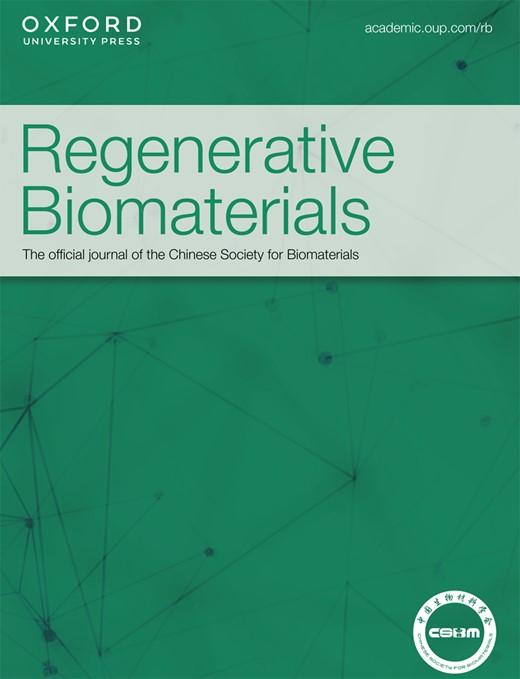Tissue adhesive, ROS-scavenging and injectable PRP-based “plasticine” for promoting cartilage repair
IF 8.1
1区 医学
Q1 MATERIALS SCIENCE, BIOMATERIALS
引用次数: 0
Abstract
Platelet-rich plasma (PRP) that has various growth factors has been used clinically in cartilage repair. However, the short residence time and release time at the injury site limit its therapeutic effect. The present study fabricated a granular hydrogel that assembled from gelatin microspheres and tannic acid (TA) through their abundant hydrogen bonding. Gelatin microspheres with the gelatin concentration of 10 wt% and the diameter distribution of 1–10 μm were used to assemble by TA to form the granular hydrogel, which exhibited elasticity under low shear strain, but flowability under higher shear strain. The viscosity decreased with increase of shear rate. Meanwhile, the granular hydrogel exhibited self-healing feature during rheology test. Thus, granular hydrogel carrying PRP not only exhibited well-performed injectability, but also performed like a “plasticine” that possessed good plasticity. The granular hydrogel showed tissue adhesion ability and reactive oxygen species (ROS) scavenging ability. Granular hydrogel carrying PRP transplanted to full thickness articular cartilage defects could integrate well with native cartilage, resulting in newly formed cartilage articular fully filled in defects and well-integrated with the native cartilage and subchondral bone. The unique feature of the present granular hydrogel, including injectability, plasticity, porous structure, tissue adhesion, and ROS scavenging provided an ideal PRP-carrier towards cartilage tissue engineering.组织胶粘剂,ros清除剂和可注射的prp基“橡皮泥”促进软骨修复
含有多种生长因子的富血小板血浆(PRP)已被临床应用于软骨修复。但其在损伤部位停留时间短,释放时间短,限制了其治疗效果。本研究将明胶微球与单宁酸(TA)通过丰富的氢键组合而成的颗粒状水凝胶。用明胶浓度为10 wt%、粒径分布为1 ~ 10 μm的明胶微球经TA组装而成的颗粒状水凝胶在低剪切应变下具有弹性,在高剪切应变下具有流动性。黏度随剪切速率的增加而降低。同时,颗粒状水凝胶在流变试验中表现出自愈特性。因此,携带PRP的颗粒水凝胶不仅表现出良好的注射性,而且表现得像“橡皮泥”一样具有良好的可塑性。颗粒状水凝胶具有组织粘附能力和活性氧清除能力。颗粒状水凝胶携带PRP移植到全层关节软骨缺损处,与原软骨融合良好,使新形成的软骨关节充分填充缺损,与原软骨及软骨下骨融合良好。该颗粒水凝胶具有可注射性、可塑性、多孔性、组织粘附性、清除活性氧等特点,为软骨组织工程提供了理想的prp载体。
本文章由计算机程序翻译,如有差异,请以英文原文为准。
求助全文
约1分钟内获得全文
求助全文
来源期刊

Regenerative Biomaterials
Materials Science-Biomaterials
CiteScore
7.90
自引率
16.40%
发文量
92
审稿时长
10 weeks
期刊介绍:
Regenerative Biomaterials is an international, interdisciplinary, peer-reviewed journal publishing the latest advances in biomaterials and regenerative medicine. The journal provides a forum for the publication of original research papers, reviews, clinical case reports, and commentaries on the topics relevant to the development of advanced regenerative biomaterials concerning novel regenerative technologies and therapeutic approaches for the regeneration and repair of damaged tissues and organs. The interactions of biomaterials with cells and tissue, especially with stem cells, will be of particular focus.
 求助内容:
求助内容: 应助结果提醒方式:
应助结果提醒方式:


